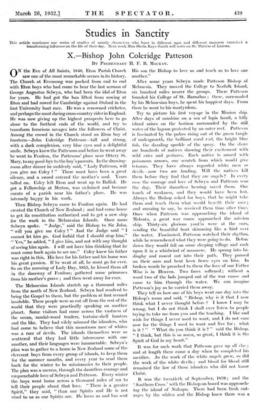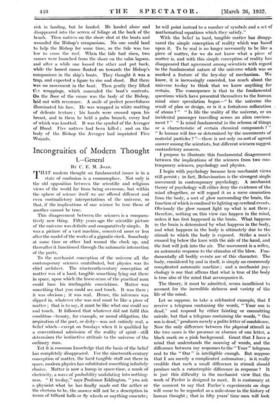Studies in Sanctity
This article continues our series of studies of saintly characters who have in different ages and different manners exercised a transforming influence on the life of their day. Next week Miss Sheila Kaye-Smith will write on St. Therese of Lisieux.
X.—Bishop John Coleridge Patteson
BY PREBENDARY H. F. 13. MACKAY.
ON the Eve of All Saints, 1840, Eton Parish Church saw one of the most remarkable scenes in its history. The Church at Evensong was packed from end to end with Eton boys who had come to hear the last sermon of George Augustus Selwyn, who had been the idol of Eton for years. He had got the ban lifted from rowing at Eton and had rowed for Cambridge against Oxford in the first University boat race. He was a renowned cricketer, and perhaps the most daring cross-country riderin England. He was now giving up the highest prospects here to go alone to the furthest ends of the world, and try to transform ferocious savages into the followers of Christ. Among the crowd in the Church stood an Eton boy of fourteen—John Coleridge Patteson—tall and strong, with a dark complexion, very blue eyes and a delightful smile. Selwyn knew the Pattesons and before he went away he went to Feniton, the Pattesons' place near Ottery St. Mary, to say good-bye to the boy's parents. In the drawing- room after dinner he suddenly said, " Lady Patteson, will you give me Coley ? " There must have been a great silence, and a sword entered the mother's soul. Years rolled on. Coley left Eton and went up to Balliol. He got a Fellowship at Merton, was ordained and became curate of a parish near his father's place. He was intensely happy in his work.
Then Bishop Selwyn came to Feniton again. He had created the Church of New Zealand ; and had come home to get its constitution authorized and to get a new ship for the work in the Melanesian Islands. Once more Selwyn spoke. " Judge," said the Bishop to Sir John, " will you give me Coley ? " And the Judge said " I cannot let him go. God forbid that I should stop him." " Yes," he added, " I give him, and not with any thought of seeing him again. I will not have hhn thinking that he must come back again to see me." Coley knew his father was right in this. His love for his father and his home was his great passion. If he went at all, he must go for ever. So on the morning of Lady Day, 1855, he kissed them all in the doorway of Feniton; gathered some primroses from his mother's grave ; and then went away for ever. The Melanesian Islands stretch up a thousand miles from the north of New Zealand. Selwyn had resolved to bring the Gospel to them, but the problem at first seemed insoluble. These people were so cut off from the rest of the world that they were practically speaking on another planet. Some visitors had come across the vastness of the ocean, sandal-wood traders, tortoise-shell hunters and the like. They had vilely misused the islanders, who had come to believe that this monstrous race of whites was a race of devils. The islands themselves were so scattered that they had little intercourse with one another, and their languages were innumerable. Selwyn's plan was to gather to a home in New Zealand some of the cleverest boys from every group of islands, to keep them for the summer months, and every year to send them back for the winter to be missionaries to their people. The plan was a success, through the dauntless courage and unquenchable love of Selwyn and Patteson. Every winter the boys went home across a thousand miles of sea to tell their people about that love. " There is a greater 13irit," they said, " than our Spirits and He is not cruel to us as our Spirits are. He loves us and has sent
His son the Bishop to love us and teach us to love one another."
After some years Selwyn made Patteson Bishop of Melanesia. They moved the College to Norfolk Island, six hundred miles nearer the groups. There Patteson founded his College of St. Barnabas ; there, surrounded by his Melanesian boys, he spent his happiest days. From there he went to his martyrdom.
Try to picture his first voyage in the Mission ship. After days of sunshine on a sea of lapis lazuli, a hilly island arises on the horizon surrounded by the still, water of the lagoon protected by an outer reef. Patteson is fascinated by the palms rising out of the green tangle of undergrowth, the brilliant coral reef, the bright blue fish, the dazzling sparkle of the spray. On the shore are hundreds of natives showing their excitement with wild cries and gestures. Each native is armed with poisonous arrows, one scratch from which would give tetanus. They have always regarded white men as devils—now two are landing. Will the natives kill them before they find that they are angels ? In every case the courage and love of Selwyn and Patteson won the day. Their dauntless bearing saved them. One touch of weakness, and they would have been lost. Always the Bishop asked for boys, that he might lake them and teach them what would benefit their race ; and amazing to say, he received them time after time. Once when Patteson was approaching the island of Melanta, a great war canoe approached the mission ship. Thirty-six glorious youths were at the oars, sending the beautiful boat skimming like a bird over the water. Fascinated. Patteson watched their rhythm, while he remembered what they were going to do. Before dawn they would fall on some sleeping village and rush upon it in a whirlwind of massacre. He sprang into his dinghy and rowed out into their path. They paused on their oars and bent keen fierce eyes on him. In broken words he preached to them the love of our Father Who is in Heaven. Two faces softened ; without a word two of the lads jumped out of the war canoe and came to him through the water. We can imagine Patteson's joy as he carried them away.
They tell us how one of his boys went one day into the Bishop's room and said, " Bishop, why is it that I now think what I never thought before ? I know I may be wrong, but I do not think I shall ever listen to people trying to take me from you and the teaching. I like and wish for things I never used to want, and I do not care now for the things I used to want and live for ; What is it ? " " What do you think it is ? " said the Bishop. " I think, but this is so ?nava, so great, I think it is the Spirit of God in my heart."
It was for such work that Patteson gave up all else ; and at length there came a day when he completed his sacrifice. As the work of the white angels grew, so did the work of the white devils ; and blood for blood still remained the law of those islanders who did not know Christ.
It was the twentieth of September, 1870 ; and the ' Southern Cross ' with the Bishop on board was approach- ing the island • of Nukapu. There had been fresh out- rages by the whites and the Bishop knew there was a risk in landing, but he landed. He landed alone and disappeared into the screen of foliage at the back of the beach. Then natives on the shore shot at the boats and wounded the Bishop's companions. No one could land to help the Bishop for some time, as the tide was too low to cross the reef. When the tide had risen, two canoes were launched from the shore on the calm lagoon, and after a while one loosed the other and put back,. while the loosed canoe floated on towards the Bishop's companions in the ship's boats. They thought it was s- trap, and expected a figure to rise and shoot. But there was no movement in the boat. Then gently they lifted the 'wrappings, which concealed the boat's contents. On the floor of the canoe was the body of the Bishop, laid out with reverence. A smile of perfect peacefulness illuminated his face. He was wrapped in white matting of delicate texture ; his hands were crossed upon his breast, and in them he held a palm branch, every leaf of which was knotted. It was the symbOl of the Avenger of Blood. Five natives had been killed ; and on the body of the Bishop the Avenger had imprinted Five Wounds.



































 Previous page
Previous page